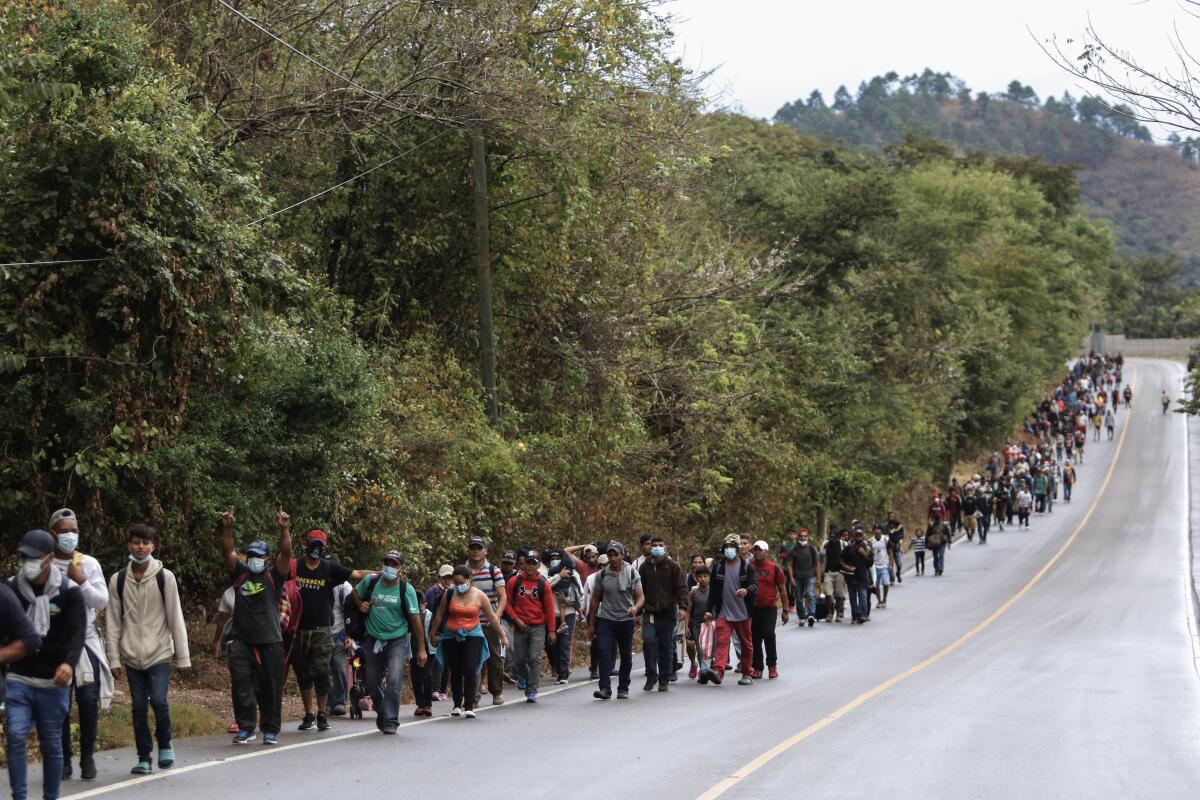Fleeing the pandemic and two hurricanes, thousands of migrants walk toward the U.S.

- Share via
CARPAJÁ, Guatemala — Any Ortega has not been home since a pair of hurricanes devastated Honduras in November, leaving hundreds of thousands of people displaced.
Now, Ortega, 30, is among the latest group of Honduran migrants and asylum seekers making their way north through neighboring Guatemala toward Mexico — where the government has fortified border security with thousands of national guard troops — and toward the U.S. border hundreds of miles to the north.
This caravan could represent a resurgence of such efforts as President-elect Joe Biden, who has vowed to reform President Trump’s hard-line immigration policies, takes office Wednesday. For Trump, migrant caravans were a vivid symbol of what he called an out-of-control immigration system, and his administration moved to clamp down while successfully pressuring Mexico to stop many U.S.-bound migrants long before they reached the border.
Biden’s election has raised hopes in Central America — devastated by last year’s hurricane-driven floods, in addition to chronic issues of poverty and gang violence — that the incoming administration may ease its policies for asylum seekers and other migrants. This caravan could prove an early test for the new administration, as will relations with the Honduran government, led by President Juan Orlando Hernández, who, along with his security forces, has been implicated in three U.S. drug-trafficking cases.
With President Trump isolated in the White House since the Jan. 6 Capitol riot, Vice President Mike Pence increasingly fills the void in their waning days in office.
In Ortega’s case, floods caused by hurricanes Eta and Iota inundated her neighborhood in low-lying Chamelecón, an urban area just south of San Pedro Sula in northwestern Honduras.
“We lost everything, absolutely everything,” Ortega said late Friday night as she walked with the group after crossing into Guatemala.
The storms affected millions of people across Central America.
Ortega took shelter with her three children and mother in a makeshift camp under a bridge. Floodwaters eventually receded, but they were unable to return home.
“Houses are still full of mud,” she said. “There has been no help from the government, only from other people.”
Between coronavirus lockdowns, the related recession and hurricane damage, Ortega has been unable to find work. So she left her children, ages 8, 12 and 14, in the care of their father and other relatives and set out Friday morning with the U.S.-bound migrant caravan.
Some 7,500 Honduran migrants and asylum seekers are making their way north. They face military blockades in Guatemala, a fortified Mexican southern border and an uncertain U.S. response under a new administration, should they make it that far. By Saturday, most had entered Guatemala via the El Florido border crossing, according to estimates by Guatemala’s National Immigration Institute.
Honduran and Guatemalan security forces in the border region had blocked the way, but people pushed on, and police eventually relented.
“The government of Guatemala regrets this transgression of national sovereignty,” the government said Saturday in a statement, calling on Honduran authorities to “contain the mass departure of their inhabitants.”
A baby’s cries rang out late Friday night as the caravan advanced on foot into Guatemala under a star-filled sky.
“Don’t worry, we’re almost there,” someone joked in response, and a young man mimicked a bus driver calling out destinations for passengers: “Guatemala, Tecún Umán, Mexico, Tijuana!”
Guatemala enacted emergency measures Thursday in seven of the country’s 22 departments, restricting freedom of movement and assembly and deploying roughly 2,000 soldiers and police to enforce entry requirements, which now include negative coronavirus test results.
Guatemala’s coronavirus testing rate is among the lowest in the region, but the country of 17 million has had 148,500 confirmed cases, more than Honduras and more per capita than Mexico.
Guatemala and Mexico both maintain that military reinforcements are a necessary part of efforts to safeguard public health. Rosario Martínez, a Guatemalan researcher with the Latin American Social Studies Institute, disagrees.
“It is the perfect excuse,” said Martínez, who has been researching shifting Central American immigration patterns in recent years and, particularly, since the onset of the pandemic in March. “The pandemic is being used as a pretext to stop the advance of caravans,” she said.
At a checkpoint in La Ruidosa, a key highway junction in eastern Guatemala, soldiers and police stopped vehicles Friday to check identification documents in search of Hondurans who had either traveled on their own or split from the main caravan group.
Many of the van and minibus transport vehicles were packed with passengers, not all of whom were wearing masks, in violation of mandatory government measures to contain the spread of COVID-19. The Times did not witness any health citations being handed out Friday afternoon.
Health officials, who were set up at the checkpoint under an olive-green tarp labeled “U.S.,” informed Hondurans of the requirement of a negative test result for entry. Those who did not have one were held in the area.
Roger, who requested that his last name not be used for security reasons, was one of more than two dozen Hondurans stuck at the checkpoint Friday afternoon. The 22-year-old said he left Thursday from Catacamas, in eastern Honduras, with two friends and boated across the Motagua River into Guatemala before running into the checkpoint.
“We had already planned to leave, caravan or not,” he said.
Roger has a small gun-repair workshop, but Honduras has implemented strict lockdown measures off and on for months, and he has been unable to work. That was his main reason for leaving, but violence was also a factor, he said.
A police bus arrived to take Roger and the other Hondurans back across the border. They were among roughly 600 people sent back Friday from checkpoints and border regions around Guatemala.
Roger said he planned to see if he could afford a coronavirus test near the border to come right back. He knows Biden will take office this month and is hoping immigration and asylum restrictions enacted in recent years will ease up.
“It could be a good opportunity,” he said.
Biden has announced plans to send a bill to Congress that would provide a pathway to citizenship for immigrants in the U.S. illegally, but plans for future migrants, including asylum cooperation agreements that send Central Americans back to neighboring countries, are not clear.
Cuffe is a special correspondent.
More to Read
Sign up for Essential California
The most important California stories and recommendations in your inbox every morning.
You may occasionally receive promotional content from the Los Angeles Times.










